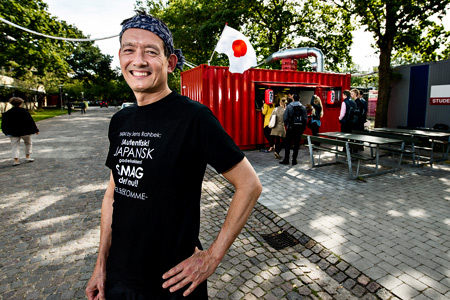“It’s like being a student again,” calls Jens Rahbek from the door to the red container located behind Building 324 on Lyngby Campus. He and two other employees have their work cut out turning flame-grilled sticks and laying out sushi trays with chicken or raw salmon, rice, seaweed and soya in his food stand named ‘Yatai’, which is the Japanese word for ‘street kitchen’. The stand serves up good, quick food prepared according to authentic Japanese traditions.
“I’ve gone back to my roots. The food I’m preparing now reminds me of the yakitori sticks I ordered in Tokyo in 1983—when I discovered I wanted to be a chef. It’s the closest I’ve come to that time when my eyes lit up. Everything before this had just been part of the journey to get here,” he adds.
Sushi success
Jens Rahbek and his brother Kim grew up with a Japanese mother and a Danish father, who owned a fish factory. His parents were convinced that the Danish people would quickly develop a taste for Japanese cuisine. And they were right.

In 1994, the two brothers opened Sticks’N’Sushi on Nansensgade in central Copenhagen. The restaurant soon became a roaring success, turning into a chain with several hundred employees, and the media dubbed Jens Rahbek ‘The Sushi King’. But while his brother took over running the Sticks’N’Sushi chain that currently comprises ten restaurants in Copenhagen, North Zealand and the UK, Jens Rahbek sought out new challenges.
He opened the Japanese gourmet restaurant Ebisu in the former Customs House, as well as Etika restaurant in Copenhagen. Last year, he moved into the ‘Papirøen’ area of Copenhagen to serve street food.
Towards the end of 2014, one of the DTU professors happened to swing by his food stand on Papirøen. The professor thought it would be wonderful if Jens Rahbek could bring his street kitchen to DTU. And after a short period of reflection, Jens Rahbek ‘upped sticks’ and moved his red container to the DTU campus in early September.
Less elitist food
“I’ve always dreamed of preparing delicious dishes other than the ones we serve at Sticks’N’Sushi. I want to contribute authenticity and love through my cuisine. The young generation is really cool. They know that we simply have to take care of our society, the world and each other. So if I can make a contribution by serving Japanese food that is healthy, nutritious and easy to digest, then the students can build up the energy they need to learn and study. I want my food to be like fuel,” says Jens Rahbek.
Article from DTUavisen no. 8, October 2015.
In addition to being an alternative to the canteen menu, the street food is intended to generate a lively environment life between the buildings and create a forum for informal meetings between students and staff.
You can already buy lunch at street food locations by buildings 116, 322, and 414, and more is to come. Read about your choice of street food.